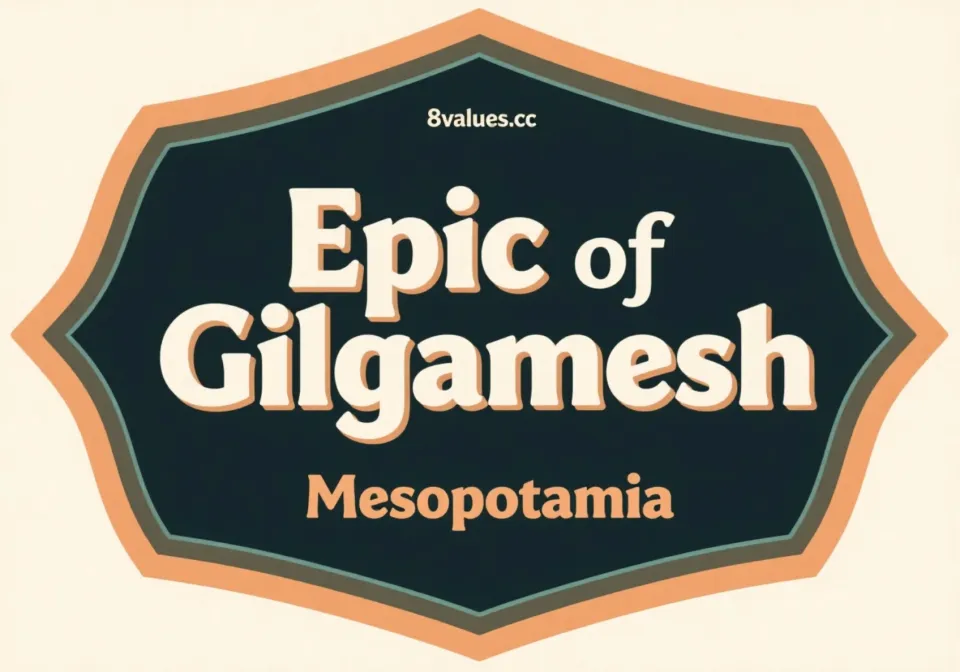Epic of Gilgamesh: Exploring the Eternal Wisdom and Heroism of Mesopotamia
The Epic of Gilgamesh is the oldest heroic epic in the world known. It tells the life, friendship, adventure, and exploration of the mystery of life and death of Gilgamesh, the king of the ancient Mesopotamia in the Mesopotamia basin. It is the foundation work for understanding the ancient Mesopotamia civilization and the origin of human values. It is still inspiring for contemporary people to understand the topics of power, test of life and political values.
The Gilgamesh Epic is a famous epic from the ancient Mesopotamia and is known as the oldest heroic epic in the world . The literary history of this epic begins with five poems about Gilgamesh, the king of Uruk, about 2100 BC. These independent Sumerian stories were then used as material, codified into later versions of the Akkadian epic. Scholars believe that this epic, as the foundational work of religion and heroic traditions, shaped the prototypes of later heroes such as Heracles and had an impact on Homer's epic.
The historical period described in this epic is believed to date from 2700 BC to 2500 BC, 200 to 400 years earlier than the earliest known literary works written in writing. The epic content brings together many myths and legends from the Mesopotamia, with a total of more than 3,000 lines.
The discovery process and main version of the epic
The Epic of Gilgamesh is engraved in cuneiform on a clay tablet. Its earliest version of Sumerian poetry can be traced back to the Third Dynasty of Ur (c. 2100 BCE).
Dust-covered mud boards and the light of day again
The modern discovery of this epic began in the mid-19th century. In 1849, the British archaeologist Austen Henry Layard and his assistant Hormuzd Rassam discovered the library of the Assyrian king Ashurbanipal in Nineveh, the ancient capital of Assyrian. In the following years, they dug up about 15,000 pieces of Assyrian clay tablets engraved with cuneiform.
In 1872, George Smith, who was employed by the British Museum, discovered fragments of the stories of the flood . This discovery immediately caused a huge sensation because it supported the records of the Bible in some details. Initially, the central character in the epic was mistakenly read as “Izdubar.” It was not until the 1920s that all clay tablets were basically restored and deciphered, and Sumerianist Samuel Noah Kramer was the first to decipher the part of the Sumerian legend.
In recent years, the application of artificial intelligence software has greatly accelerated the process of discovering new fragments scattered in museums around the world.
Two major versions and Sumerian poetry
To date, the Gilgamesh Epic has been found in many languages, including Akkadian, ancient Babylonian, Julian and Hittite. Modern scholars mainly refactor them according to two versions:
- Old Babylonian version : dates back to the 18th century BC. This version is named after its opening phrase "Surpassing All Other Kings ".
- Standard Babylonian version : compiled by the priest Sîn-lēqi-unninni (黑坐坐坐) from about 13th to 10th centuries BC. This version contains twelve clay boards, about two-thirds of which have been restored. Its opening term is "Sha naqba īmuru" ( He Who Saw the Deep) , which literally means "those who see the abyss"). The "deep" here refers to the mysterious information about Ea, the spring of wisdom brought back by Gilgamesh from Utnapishtim.
In addition, there are five existing older Sumerian poems that are considered independent stories rather than components of a single epic. In these Sumerian versions, Gilgamesh's name is "Bilgames".
Gilgamesh's heroic deeds: From tyranny to wisdom
The Epic of Gilgamesh revolves around the story of friendship between Gilgamesh, the king of Uruk, and his friend Enkidu . The epic shaped Gilgamesh's image as he grew from a tyrant to a sage.
Uruk's Tyrant and God-made Opponent
The epic begins with Gilgamesh, the ruler of the Uruk city-state, one-third of whom are humans and two-thirds of whom are gods . He relies on his power to oppress the people. His oppression of young women is manifested in raping the bride on their wedding night; for young men it may be forcing them to perform games, strength tests or build city walls.
The people cried to the gods because of their tyranny, and the gods responded to their plea. Aruru, the goddess of creation, thus created Enchidu , a savage who is as powerful as Gilgamesh, full of hair and living in the wilderness with animals.
Enchidu's Civilization and Heroic Friendship
Enchidu destroys the hunter's trap, and the hunter turns to Gilgamesh for help. Gilgamesh ordered the hunter to take the sage prostitute (Shamhat) to seduce Enchidu. Through six days, seven nights (or two weeks) love, the god prostitute made Enchidu complete the first transformation of civilization. Although Enchidu was abandoned in horror by his group of animal relatives, the god prostitute comforted him: " Don't be sad, you now have knowledge, like a god ."
Enchidu then learned to eat human food, drink beer, and came to Uruk. When he learned of Gilgamesh's atrocities against the bride, he was furious. The two then had a fierce battle, and in the end Gilgamesh won, but the two felt sympathy and became friends.
Expedition to Cedar Forest: Kill Humba
To gain fame and glory, Gilgamesh proposes to embark on a six-day journey with Enchidu, heading to the legendary Cedar Forest, killing its guardian, the demigod monster Humbaba .
Although Enchidu and the elders in the city warned them about the dangers of the trip, Gilgamesh did not retreat. During the expedition, the sun god Shamash blessed them. During the battle, Shamash sent thirteen strong winds to trap Hombaba and made him capture. Hombaba knelt down and begged for mercy, proposing to become a slave to Gilgamesh and cut down cedars for his use. Gilgamesh felt mercy, but Nqidu insisted that Humbaba must be killed in order to establish their eternal reputation. Humba cursed the two before being beheaded by Gilgamesh.
Angry Ishtar and Enchidu's death
After the hero returns, the goddess Ishtar is fascinated by the charm of Gilgamesh and courtesys him. However, Gilgamesh rejects her and lists Ista's cruel treatment of her past lovers (such as Dumuzi).
Ista is angry and asks her father Anu to send Bull of Heaven to earth to seek revenge. The bull of the sky descended to Uruk City, causing extensive damage (such as lowering the water level of the Euphrates River and swallowing 300 people). Without the help of God, Gilgamesh and Enchidu teamed up to kill the Bull of Heaven. As Ista wails, Enchidu even throws one of the cow's hind legs at her as an insult.
Because of killing Humbaba and the Bull of Heaven, the gods decided to punish the two heroes and finally sentenced Enchidu to death . In his dream, Enchidu saw himself marked as dead, and his condition worsened and he died twelve days later. Gilgamesh was distraught and held his friend's body until the maggots fell from the nostrils of the corpse, he admitted that Enchidu was dead.
Exploration and Philosophical Thoughts of Immortality
Enchidu's death made Gilgamesh begin to fear his own death, and thus embark on a long and dangerous journey to seek the secret of eternal life .
Visit Utnapishtim, a distant person
Gilgamesh put on his animal skin and wandered in the wilderness, finally reaching Mount Mashu, the twin peaks at the end of the world. He traveled through the tunnel of the sun god Shamash and entered the wonderful "Garden of Gods" where gems grow.
He then met the wine girl Siduri . Siduri tried to dissuade him: "You will never find the life you are pursuing. Because when the gods created human beings, they kept their lives in their own hands." Siduri advised him to be content with the simple pleasures of life.
Nevertheless, Gilgamesh was directed to find the ferryman Urshanabi, crossing the "water of death" to the island where Utnapishtim ("Far From Away") lives. Utnapishtim is the only surviving human being and is given divine eternal life by the gods.
The Myth of Flood and the Theft of the Grass of Eternal Life
Gilgamesh asks Utnapishtim how to obtain immortality. Utnapishtim then tells the story of the Flood . He explained that the gods decided to bring down the flood to destroy humanity, but God Enki informed him in advance and asked him to build a ship carrying his family, craftsmen and "all animals in the field." The storm lasted for six days and six nights, destroying all human beings. Finally, Enlil, despite his anger, blessed Utnapishtim and his wife and granted them eternal life. This is roughly consistent with the flood story in the Babylonian epic Atra-Hasis.
Utnapishtim pointed out to Gilgamesh that his achievement of immortality was a unique reward. To prove that Gilgamesh cannot resist the fate of mankind, Utnapishtim challenged him to stay awake for six days and seven nights, but Gilgamesh fell asleep immediately.
When Gilgamesh left, Utnapishtim's wife was kind-hearted and prompted her husband to reveal that a plant that will make him young again grew under the sea, known as the Plant of Heartbeat. Gilgamesh obtained the plant by tying stones on his feet and diving into the seabed. However, on his way home, when he stopped to take a shower, a snake (serpent) smelled the scent and stole the plant and shedded its skin as he left.
Gilgamesh finally wept, realizing that his efforts to obtain immortality were in vain. He returned to Uruk City and saw its magnificent walls, praising this lasting achievement to Urshanabi, implying that human immortality lies not in the continuation of individual life, but in the achievements of civilization left behind .
Description of the Dead Friend in the Underworld
The twelfth clay board of the epic (usually considered to be attached to later generations) tells the conversation with the ghost of Enchidu, created by Gilgamesh through Shamash. Enchidu described to him that the Netherworld was a "house of dust" and a place of darkness, where residents fed on clay and wore bird feathers. The purpose of this section is considered to explain to the readers the various fates of the deceased in the afterlife.
Discussion on the far-reaching influence and values of "Epic of Gilgamesh"
The Epic of Gilgamesh is not only the pioneering work of literature, it explores the fate of mankind, the mystery of life and death, the responsibility of rulers, and the value of friendship, providing an important perspective for understanding the moral and political values of ancient Near East.
Literary themes and heroism
The epic enthusiastically celebrates the heroic behavior of ancient heroes and the friendship between heroes. The initial cruel Gilgamesh completed the transformation from "adventurer to wise" after experiencing friendship with Enchidu, common adventures and loss of close friends. He finally understood destiny and accepted that death was an inevitable common destiny of mankind, but his pursuit of eternal merits praised the ancient Babylonians' simple desire to explore the laws of nature, understand the mysteries of life, and the positive and enterprising spirit of daring to disobey God's will.
Relationship with ancient classics and later cultures
The Epic of Gilgamesh is considered to be a key carrier of cultural exchanges and inheritance in the ancient Near East.
1. Parallel relationship with the Bible:
Scholars generally believe that in the Hebrew Bible, many themes, plots and characters are related to the Gilgamesh Epic:
- The Garden of Eden and the Fall of Humanity: The story of Enchidu/The Prostitute is believed to have similarities to the plot of Adam/Eve in Genesis. The characters in both stories are created by God from earth, both live in nature, accept the temptation of women, and are given knowledge, and then lose their original homeland. The plot of the snake stealing the grass of immortality in the epic also becomes another similarity.
- Noah's flood: Scholars such as Andrew R. George believe that the flood narrative in Genesis is very similar to the description in Gilgamesh Epic, and even matches "point by point, in the same order", so "almost undoubtedly" originates from the common tradition of Mesopotamia.
- The advice of Ecclesiastes: Siduri's advice to persuade Gilgamesh to enjoy the simple pleasures of life is considered to be a direct reference by the author of Ecclesiastes.
2. Impact on Greece and the Legends of Alexander:
The powerful themes and tragic power of the epic are believed to have similarities with Homer's Iliad and Odyssey, and even have substantial effects on them. In addition, Gilgamesh's pursuit of the Grass of Immortality inspired the later legend of Alexander the Great's search for the Fountain of Life .
This ancient document from mesopotamia continues to exert influence in the long river of history by exploring the struggles of human beings in the face of divine will and destiny, as well as the formation of individual values. Gilgamesh's transformation from a tyrant to a sage is a microcosm of the continuous exploration of good king and personal political values in human civilization. For readers interested in gaining insight into how ancient heroes faced power, death, and value choices, they can reflect on the significance of these eternal philosophical questions in today’s society by completing tools similar to the 8Values political test .
(Note: "Gilgamesh" in Sumerian was once read as "Bilgames".






